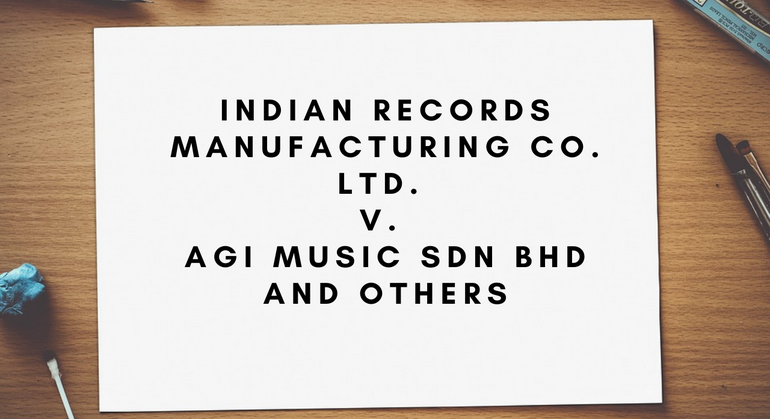

Indian Records Manufacturing Co. Ltd. v. Agi Music Sdn Bhd And Others
This suit was instituted by the Indian music company, Indian Record Manufacturing Co. Ltd. (IRMCL), seeking a permanent injunction against Agi Music Sdn Bhd, Mr. Illaiyaraja, and Unisys Info Solutions Private Ltd. for its copyright infringement over the entire musical works and sound recordings contained in thirty identified feature films produced between 1978 to 1980 (Suit Films). The case of Indian Record Manufacturing Co. Ltd. (IRMCL) is that Mr. Illaiyaraja, who is a renowned South Indian film composer, songwriter, singer, instrumentalist, conductor-arranger, orchestrator, and lyricist, gave the right of administering the musical work of all his songs in feature films produced before 2000, including those in the Suit Films, to Agi Music Sdn Bhd, a Malaysian music company.
It was the contention of Indian Record Manufacturing Co. Ltd. (IRMCL) that they were having the absolute copyright ownership of the musical works and sound recordings contained in the Suit Films by virtue of the written agreements of assignment executed by Indian Record Manufacturing Co. Ltd. (IRMCL) with the respective film producers of the Suit Films, who in accordance to Indian Record Manufacturing Co. Ltd. (IRMCL) were the first owners of the musical works. All the assignment agreements were produced before the Court.
In defense, Mr. Illaiyaraja claimed copyright over his musical work as the composer or author of the work and denied IRMCL's claim that the producers of the Suit Films are the first owners of the musical compositions and the sound recordings composed by him. Mr. Illaiyaraja also claimed that the copyright of the owner of a cinematograph film cannot impeach the copyright of the author of the underlying musical works. No documents or evidence was led by Mr. Illaiyaraja in support of his claims and statements. The other defendants remained ex parte.
Issues
- Who is the first owner of musical works composed by Mr. Illaiyaraja?
- While the producers of the respective Suit Films are the first owner of the copyright therein, whether Mr. Illaiyaraja can claim any independent copyright over the same as the music composer?
Judgment
The Court noted that the word "author" and the word "owner" connote different meanings under the Copyright Act. The Court observed that the "author" of different kinds of copyright works has been clearly defined under the Copyright Act, and in the case of a cinematograph film, i.e., a composite work, the producer is its author. Moreover, the Court observed that the "first ownership" of a cinematograph film also belongs to the producer, unless there is an agreement to the contrary in terms of Section 17(b) of the Copyright Act.
The Court reaffirmed that the producer is rightly given the exclusive rights of authorship of the composite work and first ownership if there is no agreement to the contrary because he takes the responsibility and initiatives of blending various intellectual works and performances together, for which he invests and engages with various authors and performers of underlying works; and only he has the right to disintegrate the blending, if needed, to carry out the assignments as per Section 19[3] of the Copyright Act.
With respect to the copyrightable subjects in the matter, the Court held that in the case of a musical work in isolation, Mr. Illaiyaraja is the author of the underlying musical works composed by him, but where the musical work forms part of a cinematograph film as sound recording, the producers of the Suit Films are the authors of their respective Suit Films. As regards the first ownership, in the absence of any agreement to the contrary, the producers are the first owners of the copyright in respective Suit Films including sound recordings as per Section 17(b) of the Copyright Act; and only they could disintegrate and assign the underlying works of their respective Suit Films as per Section 19 of the Copyright Act. Relying on an earlier judgment of the Court in Agi Music Sdn Bhd. v. Mr. Illaiyaraja as well as IPRS Limited v. Eastern Indian Motion Pictures Association and Others, the Court answered this issue in the affirmative.
The Court highlighted that in view of Section 17(b) and (c) of the Copyright Act, of which provisions deal with creating copyrightable works on the work-for-hire basis, the Court reconfirmed that in the absence of any agreement to the contrary, the person employing or commissioning, as the case may be, will be the first owner of the copyright in such work-for-hire work; and the right of the owner will certainly override the right of the author.



